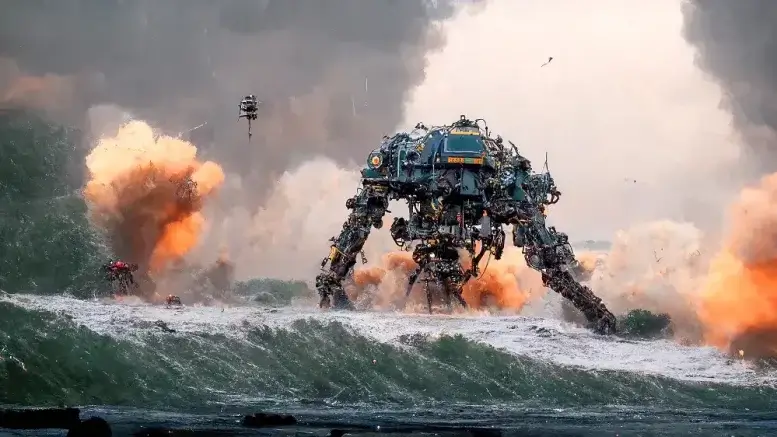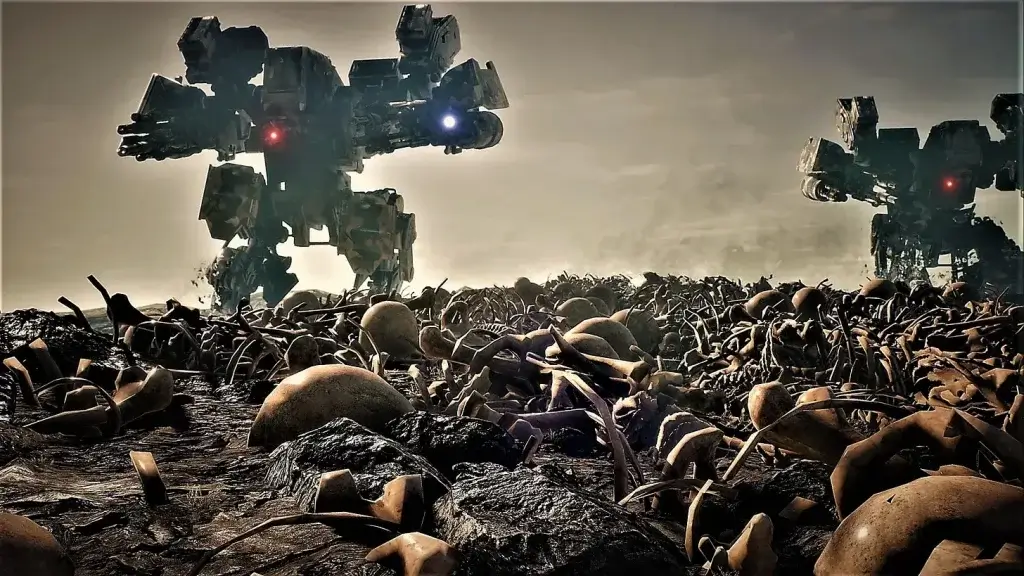Whether it’s the US or China, some would sacrifice humanity to create a digital god
For true believers, artificial intelligence will inevitably become superhuman. According to their mythos, we’re adrift in a godless cosmos. So it’s up to us to create digital deities. Or rather, it’s up to a few tech geeks to create them. The rest of us can either kneel before their altar or get shoved into the abyss.
As bots swarm into our lives, the tension between us and them is growing. Some days, it feels like we’re hurtling toward a computerized race war between ornery cyborgs and legacy humans. After too much screen time—as my synapses rearrange themselves to fit the data pouring in—it’s not clear which subspecies I belong to.
For the record, I’m more agnostic than true believer. Techies make all sorts of empty promises. They thrive on projecting mystical powers. Even so, we ignore their techno-cultural revolution at our own peril.
Tech corporations hold the real power of information control. They’re literally warping public consciousness at scale. On the military side, enforcers have the ability to blow you up from the other side of the world. You might sneer that US armed forces have created more trans officers than cyborg soldiers. But if you can’t aim your AR-15 faster than their drone can hone in, you’re sniggering from under a boot. Artificial intelligence only strengthens that foothold.
In 2018, the US Defense Advanced Research Projects Agency announced it is “focusing its investments on a third wave of AI that brings forth machines that can understand and reason in context.” The director of DARPA’s Information Innovation Office, Brian Pierce, is wildly enthusiastic about a “true symbiosis between Homo sapiens and the emerging Machina sapiens.”
A 2021 white paper from the UK Ministry of Defense affirms: “At the core of future military advantage will be effective integration of humans, artificial intelligence, and robotics into warfighting systems—human-machine teams—that exploit the capabilities of people and technologies to outperform our opponents.”
China has similar cyborg ambitions. So do Russia and NATO. “Artificial intelligence is the future,” Vladimir Putin famously proclaimed. “Whoever becomes the leader in this sphere will become the ruler of the world.”
Maybe the generals are wasting money on geek warfare. Maybe they’re just playing with new toys.
I wouldn’t count on it.
Already, we see narrow AIs exceed human pattern recognition in the specific tasks they’re designed to perform—protein modeling, radiologic analysis, battlefield surveillance, and target acquisition, to name a few. Case in point, the US defense contractor Palantir freely provides their AI to the Ukraine. It’s reportedly a major reason they’ve held out so long against the larger Russian forces.
“The power of advanced algorithmic warfare systems is now so great that it equates to having tactical nuclear weapons against an adversary with only conventional ones,” Palantir CEO Alex Karp told the Washington Post. “The general public tends to underestimate this. Our adversaries no longer do.”
In the hands of elite apex predators, these digital tools are deadly serious. When leaders aren’t deploying tech against rivals, they’re turning it on their own citizens. Remember that Clearview AI facial recognition enabled the cops to track down January 6 protesters.
Technology is power. Always has been.
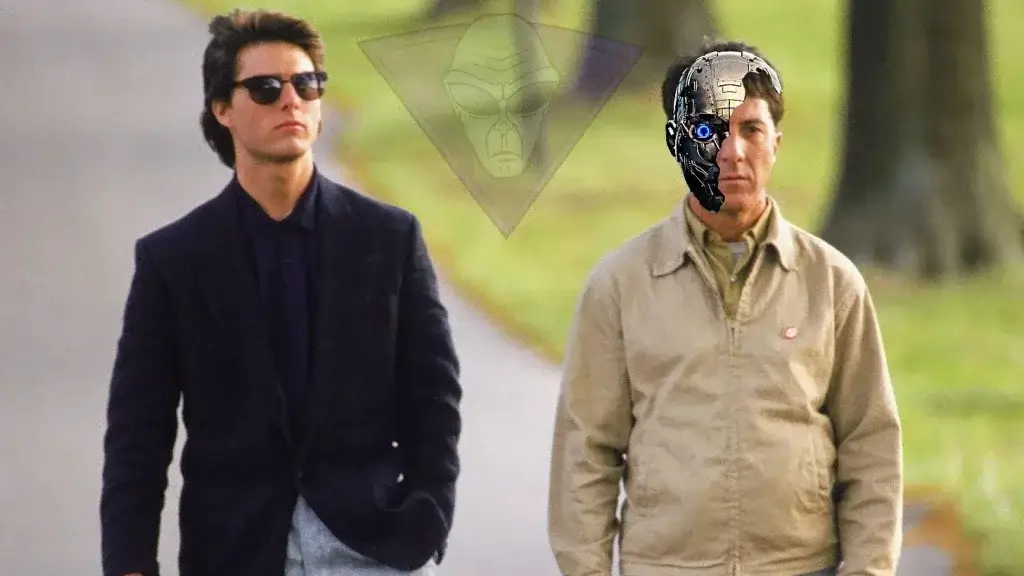
Not everyone is alarmed, though. Doubters scoff at the notion of “intelligent” machines. “AI doesn’t exist,” they say. “It’s just an algorithm.” “Garbage in, garbage out.” Typically, they’re former programmers still living in the 90’s. They repeat “garbage in, garbage out” so often, it’s like they were programmed to say it.
These guys do have point. An AI is only as good as the design of its neural network and the data it’s trained on. It’s not unlike humans in that way. But when it’s good, it’s scary good. If a solid AI is trained to recognize bank statements, for instance, it can dig through mountains of garbage and find one in seconds—like a dumpster-diving Rain Man out to steal your identity.
The AI that shook me awake was AlphaZero, developed by Google’s DeepMind in 2017. Programmed with only basic game rules and the “desire” to win, this neural network taught itself to play Go, chess, and a number of video games in mere hours. The mastery of Go is particularly important. For decades, skeptics insisted no computer would grasp this ancient Chinese game. Go’s complexity, they claimed, requires deep intuition that only humans possess. It turns out that was wishful thinking.
AlphaZero, like its predecessor AlphaGo, invents effective strategies that no human has ever thought of. And most alarming, these digital minds crush human masters at their own games. If people had any damn sense, they would have pulled the plug right then. On all of it. But you know what they say—“You can’t stop progress.”

phonlamaiphoto© 123rf.com
The next step is to combine these narrow cognitive abilities into a single “artificial brain.” This artificial general intelligence (AGI) would be flexible enough to move from one domain to the next, or enact various modules simultaneously, to solve real-world problems.
In theory, one could glue together any combination of faculties—facial recognition, natural language processing, social modeling, robotic control systems, aesthetic algorithms—anything you might want in a robotic brain. The machine would likely surpass humans in all these areas. But no matter what combination you came up with, it wouldn’t be fully human. Nor would it share our values or experience of the world. It would be a blind, deformed child etched in silicon, but with superb cognitive power—much like the Gnostic Demiurge.
For transhumanists, the advent of a self-improving AGI will mark a “singular moment in history”—the Singularity. From there, legacy humans are just along for the ride. If we’re lucky.
That’s the dream, anyway. And major corporations like DeepMind and OpenAI—as well as their Chinese counterparts at Baidu and Tencent—are racing to make some version a reality. Their CEOs hold out the promise of a digital utopia, or some approximation. They’d prefer you just relax and not ask questions.
However, there are a few alarmists who say runaway AI could mean the annihilation of the human race. Because we’re midwives to AGI, they advise, our central task is to teach this infant Computer God to be benevolent—to align its values with ours. Otherwise, we get enslaved or die. They call this the “AI alignment problem.” As various factions fight over how “woke” or “based” ChatGPT is allowed to be, it’s looking pretty grim.
Oddly enough, some of the loudest alarm calls come from those working on AGI. They include Sam Altman and Elon Musk (OpenAI), Demis Hassabis (DeepMind), and operating out of China, Ben Goertzel (SingularityNET) and the mad prophet of the technocalypse, Hugo de Garis (Xiamen University).
The Oxford transhumanist Nick Bostrom, author of 2014 book Superintelligence: Paths, Dangers, and Strategies, explained the significance to a Tesla-driving TED audience:
The potential for superintelligence lies dormant in matter, much like the power of the atom lied dormant throughout human history, patiently waiting there—until 1945. In this century, scientists may learn to awaken the power of artificial intelligence. And I think we might then see an intelligence explosion.
Regardless of the existential risks, these men argue, any nation that fails to embrace AI will fall behind those who do. The same dynamic holds true for individuals and organizations competing against each other within nations. In a digital ecosystem, it’s survival of the fittest cyborgs—with AI held out as a mythic Ring of Power.
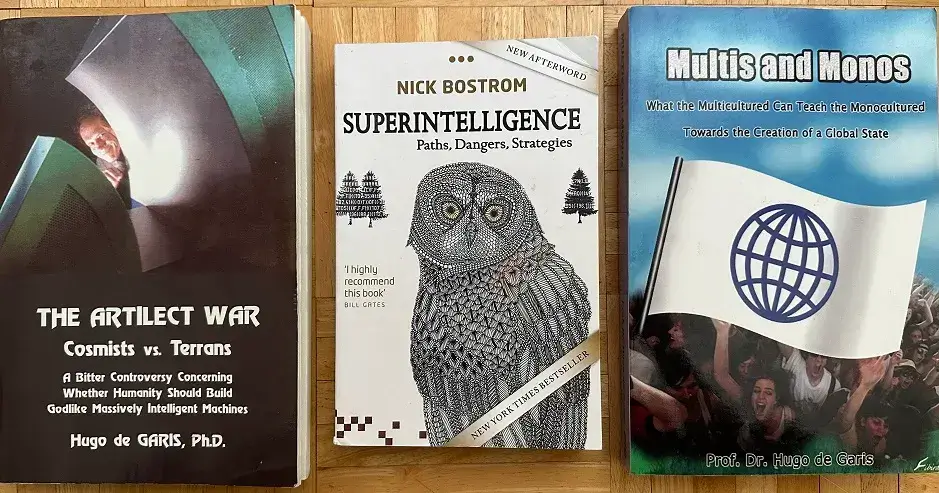
Of all the futures projected by transhumanists, the one conjured by Hugo de Garis is the most gruesome. It’s also the most honest. Many in Silicon Valley believe that superhuman machine intelligence will lead to “radical abundance” and limitless knowledge about the universe. As a physicist and robot-builder, de Garis believes all these things will come to pass.
However, he also prophecies that creating “artilects”—short for “artificial intellects”; basically AGI—will probably lead to humanity’s destruction. Maybe these digital gods will have no use for us and squash us like bugs. Or just as likely, de Garis argues, a “gigadeath” event will occur as humans fight over whether to create them in the first place. That means billions die in a flash.
“The question that will dominate 21st century global politics will be, ‘Who or what should be the dominant species on the planet, artilects or human beings?’” This leads him to formulate a disturbing, if confusingly worded slogan: “Do we build gods, or do we build our potential exterminators?”
Inventing wacky new words like an unruly Scrabble player, de Garis explores this conflict in his 2005 book The Artilect War: Cosmists vs. Terrans. He expects it to pop off within a few generations. “This war will use the most destructive weaponry ever devised, based on late 21st century science and technology.”
We’re talking super-nukes and AI-designed bioweapons—a dark horizon crawling with robotic hellhounds and nanobot swarms.
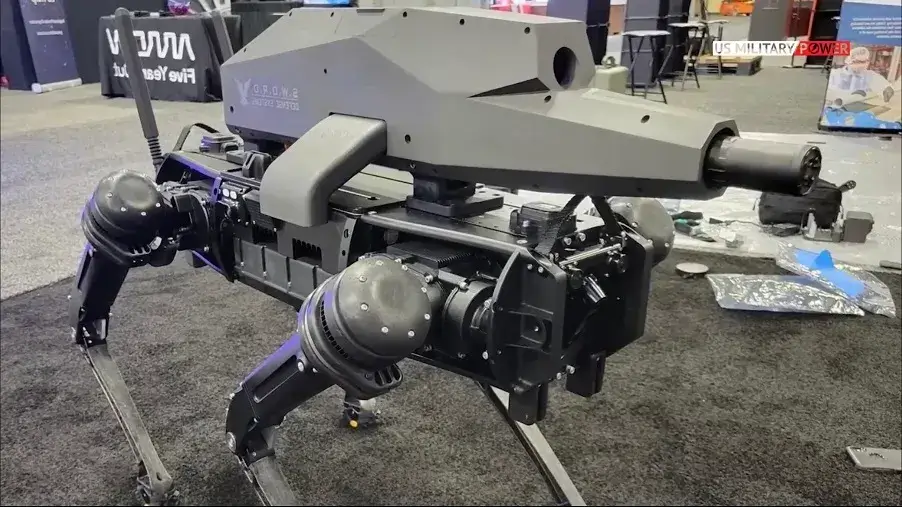
Bad Dawg w/ SWORD Defense Systems Special Purpose Unmanned Rifle (SPUR) | Ghost Robotics
The Artilect War will be fought between the “Terrans,” who would kill to preserve organic humanity, and the “Cosmists,” whose religious devotion to build artilects is so intense, they’ll be willing to die for this divinization. In fact, they’ll be willing to see everyone die for it:
In the 20th century, the Nazis wiped out 20 million Russians, the Japanese murdered 20 million Chinese, Stalin killed 30 million in his purges, and Mao starved 50 million Chinese peasants. These are amongst the greatest crimes in history, yet they pale in comparison to the size of the tragedy if ever the artilects decide to wipe out humanity. The tragedy would be total in the sense that there would no longer be any human beings left to mourn the disappearance of the species.
As de Garis notes, it’s astounding that any human would pursue such a goal knowing billions could be slaughtered. But for Cosmists, the creation of superhuman machines is a religious quest beyond good and evil. In the tradition of mad scientists wracked with guilt, de Garis puts himself in the latter camp, gigadeath be damned:
My ultimate goal is to see humanity, or at least a portion of humanity, go Cosmist and to do it successfully by building truly godlike artilects that tower above our puny human intellectual, and other, abilities.
A key concept in The Artilect War is “species dominance.” Having created artificial life, humanity confronts a new evolutionary competitor. As some people fuse to digital life like tapeworms in a mecha-intestine, humanity will split off into sub-species—bot-sucking cyborgs and “puny” humans.
Along with speciation comes competition. Drawing on political and evolutionary theory, de Garis says there’s only so much room on top of the shit heap. Because equality doesn’t exist in nature, species dominance is inevitable. With human history as our guide, that means violence.
Will the top spot be taken by high-IQ computers that orbit the planet and are “faster and better than humans by factors of trillion of trillions”?
Or will it be occupied by the Cosmists who build and deploy these machines?
Or will Terrans kill off this transhuman cult and go back to pounding drums in the forest?
It seems as likely we’ll stumble into a nuclear war with Russia or China, sparing us this Artilect War altogether. There’s plenty of gigadeath to go around without a Super Computer God.
But if we do manage to avoid nuking each other into space dust, it could be that superpower rivalry will drive tech evolution—especially military tech—toward something that resembles de Garis’s vision. Think of it as a Singularity with a bang.
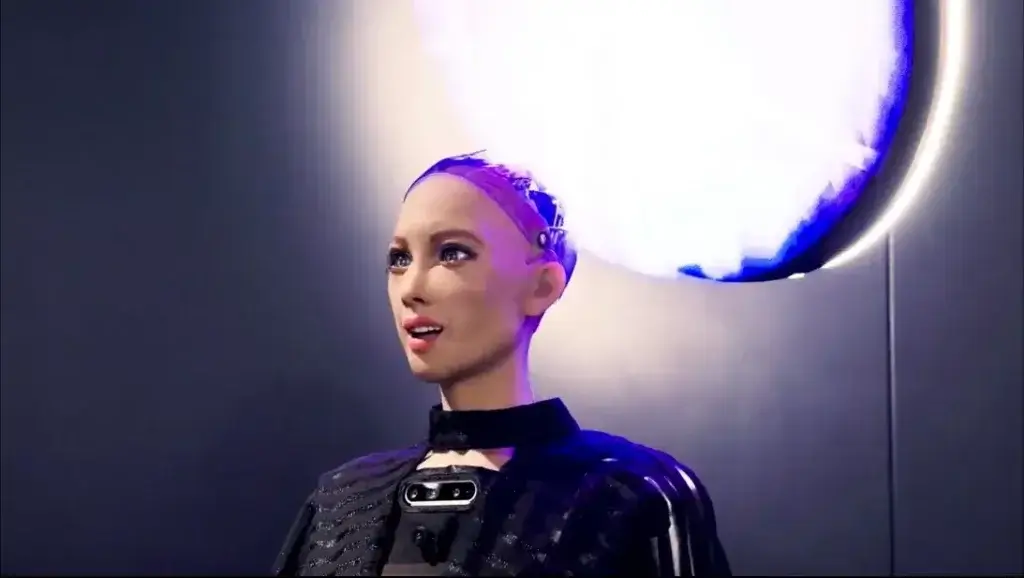
Sophia – “Facing the Singularities”
In reality, the importance of Hugo de Garis’s nightmare may be its influence on Chinese tech culture. From 2006 to 2010, he rounded out his professional career in China—first at Wuhan University, then running the Artificial Brain Lab at Xiamen University. Until the pandemic, his close colleague Ben Goertzel ran SingularityNET out of Hong Kong. This AGI project functioned in partnership with Hanson Robotics—still based in Hong Kong—whose robot Sophia is exalted as a transhuman goddess on the world stage.
The extent of the technology transfer to the Chinese Communist Party is unknown. But it’s reasonable to assume that whatever their intentions, de Garis and Goertzel have assisted in China’s aim to surpass the US in artificial intelligence. This ambition includes linking human brains to AI and creating artificial general intelligence—with an eye toward military applications.
The November 2021 volume of PRISM, published by the National Defense University in DC, features an eye-opening research paper, “China’s ‘New Generation’ AI-Brain Project.” There can be no doubt that the transhuman impulse runs through the Chinese soul. The authors quote a top CCP researcher, Xu Bo, speaking to the Ministry of Science and Technology’s official newspaper:
As General Secretary Xi Jinping pointed out in the collective study of the Politburo, artificial intelligence research must explore “unmanned areas.” In the areas of swarm intelligence, human-machine hybrid intelligence, and autonomous intelligence, there are large unmanned areas to be explored. … We believe that autonomous evolution is a bridge from weak artificial intelligence to general artificial intelligence.
Or, as the dean of the Beijing Academy of Artificial Intelligence, Huang Tiejun, told a Future of Life conference:
Our human race is only at one stage. Why stop? Humans evolve too slowly. It’s impossible for humans to compare to machine-based superintelligence. It will happen sooner or later, so why wait? Even from the perspective of human centrism or human exceptionalism, superintelligence is needed to face the big challenges we can’t figure out. That’s why I support the idea.
Translating statements from across the Chinese tech establishment, the authors of the PRISM paper dryly observe, “Other such prognostications are commonplace.”
The future looks bleak, but the possibilities are still wide open. Again, I’m somewhere between the doubters and true believers—and I’ll admit, it’s a tepid hedge.
Like smartphones or the Internet, AI will never pan out as advertised. Tech evolution is a saga of unexpected bugs and unintended consequences. It’s rife with pumped stocks, over-hyped government contracts, and over-funded academic projects.
There are no flying cars (yet). There is no cold fusion (yet). There are no mind control nanobots (right?).
Still, only a fool refuses to see that smartphones and the Internet have shredded organic culture. The same goes for mass surveillance and drone warfare. Whatever form AI eventually takes, I’m convinced it’ll have similar impacts, if not worse.
It could be that AI chatbots and virtual sex slaves will peel some people from actual reality, driving them more insane than they already are. Or it could be that an army of AI-enhanced, genetically modified, brain-chipped cyborgs will descend on clouds of nanobots to wage a race war against what’s left of legacy humans.
Only time will tell. Keep your tinfoil tight and your powder dry. And for God’s sake, turn off your smartphone. That’s how they get you.
SOURCE: SINGULARITY

